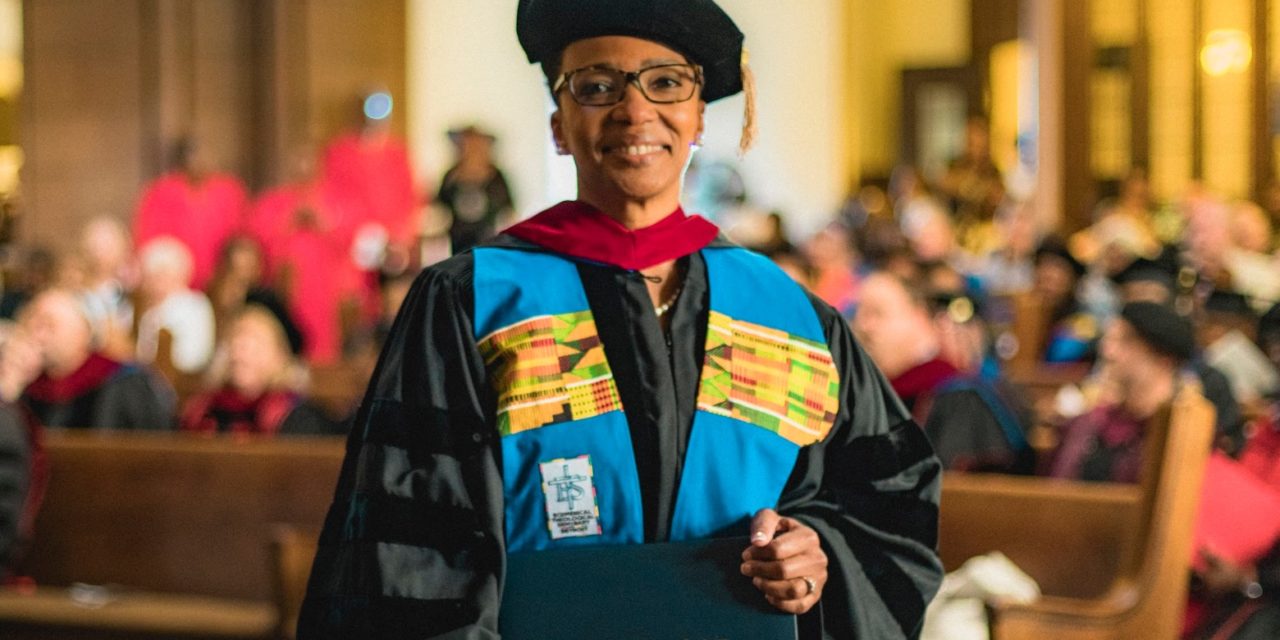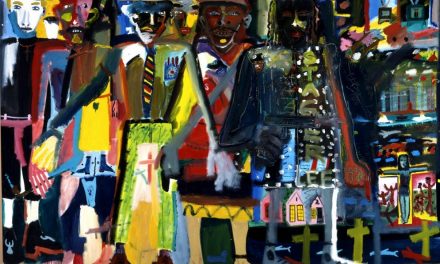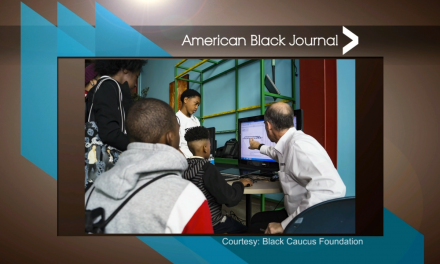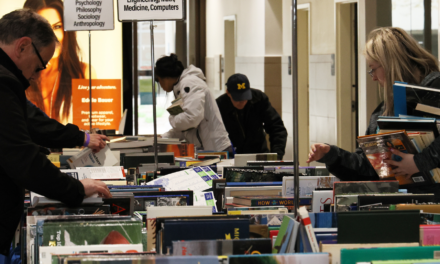This Week on American Black Journal:
Examining the State of Seminary Education and the Future of Urban-Centered Ministry
How does theological education teach its students how to lead both inside the Black church and out in the community? “American Black Journal” continues its series on “The Black Church in Detroit” with a look at the state of seminary education and the future of ministry in Detroit.
Host Stephen Henderson sits down for an in-depth conversation with the Rev. Dr. Kenneth Harris, president of Ecumenical Theological Seminary (ETS) and founding pastor of Detroit Bible Tabernacle; Rev. Angela Cadwell, an ETS graduate, Detroit Police chaplain and minister at Transformation Christian Church; and Rev. Jeremy Moseley, senior pastor at The New Mount Vernon Missionary Baptist Church and a distance learning seminary student at the College of Biblical Studies in Houston, Texas.
RELATED: Ecumenical Theological Seminary Hosts Nov. 4 Gala Fundraiser
They talk about the importance of seminary education for preparing leaders for roles in the church and the community — professors, pastors, chaplains, ACPE educators and nonprofit administrators, to name a few; the challenges of leading an urban-centered ministry; and how seminaries must stay relevant in today’s changing landscape.
Additionally, Henderson gets a detailed overview from Dr. Harris on what a seminary education entails, and learns more about the spiritual and professional journeys of Rev. Cadwell and Rev. Moseley.
Watch Now:
Full Transcript:
Stephen Henderson, Host, American Black Journal: Welcome to American Black Journal. I’m your host, Stephen Henderson. Today, we are continuing our series on the Black Church in Detroit, which is produced in partnership with the Charles H. Wright Museum of African-American History and with the Ecumenical Theological Seminary, which is often referred to as ETS. Located right in the heart of our city, the seminary prepares students for the challenges of an urban-centered ministry, and it trains them to become servant leaders not only for the church but also for society.
We wanted to check in on the current state of seminary education, so I sat down with Rev. Dr. Kenneth Harris, who is president of ETS, Rev. Angela Cadwell, who is a recent ETS graduate and Detroit Police Chaplain, and Rev. Jeremy Mosley, who is currently enrolled in the Distance Learning Seminary Program at the College of Biblical Studies in Houston, Texas.
I think a lot of people know what seminaries are and what they do in the abstract, but I always think of ETS as having a special role because of where it is here in the city of Detroit. So, talk about the particular mission and particular challenges, I guess, of being a seminary in a community that is as culturally rich as Detroit, but also a community that needs so much from the ministry as we do here in our city.
Rev. Dr. Kenneth Harris, President, Ecumenical Theological Seminary, Founding Pastor, Detroit Bible Tabernacle: Okay. That’s a big question and I’ll try to be brief. First of all, Stephen, I think I would just give a little backdrop on theological education in the United States and Canada. The accredited seminaries in the U.S. and Canada, are accredited by the Association of Theological Schools, ATS. ATS has about 270 seminaries under its wing in the U.S. and Canada. Most of them are medium-sized schools.
We’re all graduate theological schools that grant primarily master’s level and doctoral level degrees. And so, among those 270 schools, their schools, a lot of them, most of them now are affiliated with larger schools, very embedded. Or they are large schools like Southern Baptist schools, that have lots of money; lots of students. But the majority of the schools are still independent schools like ours. And so, ETS is the only fully accredited school that’s located in the city of Detroit, and we are freestanding and we are independent.
Having said that, we have a lot of challenges in terms of fundraising support. We don’t have any larger overhead group funding us money, we’re kind of on our own, OK. We and the good Lord and a lot of faith. But fortunately recently I would like to announce that we had a comprehensive visit from the Association of Theological Schools and we were awarded the highest number of years of accreditation available. We were accredited for 10 years until 2032. So that was a huge accomplishment for us.
Stephen Henderson: Yeah.
Rev. Dr. Kenneth Harris: Yeah, huge accomplishment. And so, we’re here to provide theological training to those in the urban context with our urban flavor. We definitely lean toward social justice, and then, we turn and lean toward urban initiatives and urban concerns. We are big now on healthcare, and pastoral care, and healing, and hope, with regard to what individuals, and communities and especially churches, and pastors, and parishioners are going through the last 2 years. But the challenge of the seminary is this, in the midst of all of these changes, and of course, we still can’t say post-pandemic, I wish we could, but we can’t; we’re in it.
Stephen Henderson: Yeah, we are.
Rev. Dr. Kenneth Harris: Yeah, we are in it. And so, the landscape is ever evolving with regard to what theological education should be. And so, the question is, for us, what do churches need? What do leaders need from the seminary perspective to produce more effective leaders that are on point and dealing with the kind of issues that this new day brings to us? And so, from curriculum, to how we design our courses, to the focus of the seminary, our mission statement says, “Ecumenical Theological Seminary provides a multi-confessional, multicultural, Christian theological education that prepares individuals to participate and lead while sharing the fullness of God’s love and concern for justice in the communities they serve.” That’s a mouthful. That’s what we do.
Stephen Henderson: So, Rev. Cadwell l, I want to come to you next, partially because you are a graduate of ETS, but also because you’re a Police Chaplain, which is a role that I think people don’t know a whole lot about. But let’s start with what led you to ETS, what led you to the idea of a life in the ministry? And then, what ETS gave you to be able to go out and do all the things that you do?
Rev. Angela Cadwell, ETS Graduate & Detroit Police Chaplain, Transformation Christian Church: So, actually I had no intention of going to seminary and I came in contact with a woman of God, who told me about an open house there and the Dr. Genetta Hatcher, to be quite frank. And I went to the open house just kind of trying to see about it. I really didn’t know a whole lot about seminary, but what I found was such an inviting group of people who work at ETS. And one of the things that drew me there, that drew me in was the fact that they were committed to my success.
And you could see that from day one, from driving up on the parking lot, to speaking for all the faculty, you could see that they were committed to the success of those who would be a part of the seminary. And so, after going into the Urban Ministry programs, which is one of the first things that I did, and so, I became a Chaplain after completing this Urban Ministry program. Why did I become a Chaplain after? Because what it did for me in that program, is it opened up my eyes from being in a place of isolation. I think we kind of isolate ourselves in a church, and I think it’s like our church in our four walls, and there’s so much more that needs to be done ministry-wise as the body of Christ outside of our churches.
And so, after completing the Urban Ministries program, I went to check out the Detroit Police Chaplain Program. And I was able to complete that training and to become a Chaplain at the third precinct in the city of Detroit. And it allowed me, that training, that time with the Urban Ministries program, dealing with other cultures and those types of things, allowed me, gave me what I needed to deal with everybody as my brother and sister in that just as ours and mine, you understand what I mean?
It gave me a broader view of other religions and how they operate, and just because they’re in another religion doesn’t mean that they’re not my brother or my sisters. So, it opened my eyes to some things, caused me to go through a metamorphosis and become more educated as it relates to other cultures, other religions, those types of things, spiritual matters, and begin to understand and embrace them and not fight them like we are on two different sides of the spectrum.
So, I would say that was the best thing that probably could have happened at that point in my life, which led me to go further and go to the master’s program there. And as I did that, again, I went through this transformation once again. I mean, I think we’re ever-evolving. I think there’s never a point where we just need to get stuck in this place where we think we have it all together, know it all, it’s just our church and just us is over here.
No, it’s so much more. I must say, that is one of the most rewarding experiences that I’ve had in my life as it relates to helping me to expand who I am. My thoughts, my thought processes, what I thought about the Bible, what it actually means from what I was actually taught, you know what I mean? And so, I think that the experiences that I’m going through in life and the places where I am now have a footprint in, is because of what I learned at ETS.
Stephen Henderson: At ETS, wow. Wow. Rev. Moseley, I want to bring you into the conversation here and have you talk about your ministry here in the city and what urban ministry looks like these days. Dr. Harris referred to the challenges of the pandemic, but even before that, of course, we face a lot of issues here in the city of Detroit and cities like it. But then, also talk a little about your work at another theological seminary.
Rev. Jeremy Moseley, Sr. Senior Pastor, The New Mount Vernon Missionary Baptist Church: I must admit that this is one of the most humbling experiences in that at the age of 32, I have not completed formal education. Theological training, although I’m on the role and to be in the presence of such a great man and a great woman, I’m just so honored to be here with you guys. I am a third-generation preacher on both sides of my family, my mother’s side, hyper Pentecostal Church of God in Christ, my father’s side, hyper-traditional Baptist. All right, both my great grandfather on my mother’s side, Elder Patterson, Pastor of the Chene Street Church of God in Christ, great grandfather on my dad’s side, Pastor, the Olivet Baptist Church, Reverend Ezekiel Moseley. And so, I have been embedded into preaching, a Christian tradition, which I’m so thankful for. I’ve been preaching since I was 14 years old, on May 16th, 2004. This year marks 18 years in gospel preaching ministry as it relates to the church. I’ve been everything you can think of, all right. I know the church, Youth Pastor, Co-Pastor, and now Senior Pastor, and it has been extremely challenging.
When I graduated from Detroit School of Arts, I was preaching, had a full ride to Kentucky State University. The ear, I mean, the voices in my ears, “don’t go, you don’t know how you going to make it. Stay home, stay planted, go to a community college.” and it was probably the worst decision that I ever made. In hindsight, they say hindsight is 2020, I wish I were to went, but being married young, starting a family young, in ministry, starting pastoring young, school and seminary just became, money, just so many things.
But thankfully, I seek to be well-read and well-versed and greatly communicative, but it has come with great challenges. But my faith is extremely strong, and I believe that where I am, God called me to be and it’s been such a blessing. I pastor technically in Royal Oak Township, but the address says Ferndale. Royal Oak Township is a mile radius with 2,300 residents, and Royal Oak Township is the poorest municipality in the state of Michigan. And as a young pastor coming into a traditional Baptist church, listen, it has been absolutely challenging.
When I came to New Mount Vernon, we had 30 members in a church that said 1,200. In the first couple of years, we were able to grow the ministry to about 120 people and then what happened, Dr. Harris? The pandemic, and then the pandemic came. And so, it’s been so challenging. But one of the things that have kept me going, is knowing that my faith is in a God who not only holds my tomorrow but controls my tomorrow. So, I am thankful to be on the road to completing at the College of Biblical Studies.
Fact about it, I talked about the whole money situation, I was so blessed to be a part of a conglomerate of ministers, a part of our National Baptist Convention. They called our National President, Dr. Elliott Cuff and said, Send us 40 young men, it’s a program for young men under 40, and we’ll give them a full ride and everything will be paid for. And so, that’s the road that I’m on and I’m thankful.
Stephen Henderson: So, talk about what that education will give you and how it will change your ministry in such a critical community.
Rev. Jeremy Moseley: So, I believe that the biggest piece of the puzzle is discipline. I don’t think that there’s anybody more well-read than I am, sharper, but this will polish the gift. This will show my children what it means to be planted, what it means to put your butt in a seat and remove the distractions so that you can be your best self. And it also means that I’m not so engrossed and ingrained in the natural gift, that I get that there is a need or that the calling to preach is a call to preparation and it necessitates because the information is constantly growing, information is constantly changing, the demographics of our congregations are constantly shifting from those persons that were picking cotton and even working in the automotive industry. Now, I’m preaching to college graduates and those who are well-read and well-versed outside of theology who need an extra sense of somebody that actually knows what they’re talking about. So discipline also reaffirmed who I already am as a believer. I don’t go to seminary to get saved, I go to seminary to sharpen up what’s already in me. So, I just believe that it will polish me and give me an opportunity to be on platforms that I may not be able to without the education.
Stephen Henderson: So, Dr. Harris, both Rev. Cadwell and Rev. Moseley, they describe the seminary experience as asking them to look beyond themselves, I think that is a fair way to describe it. I mean, they both, in different ways, say that it’s pushing them outside themselves. And I wonder if you can talk about that as maybe one of the purposes of theological seminary and how that works and why it’s critical to the education that you’re giving them.
Rev. Dr. Kenneth Harris: Theological education is critical to the success of any pastor, and especially in the African-American community, where we’re challenged to be biblically correct, to be technically correct, to be able to handle the basics of ministry, which begins with the Word of God. It is critical to helping people deal with real-life issues. The seminary experience, as Angela will tell you, it’s kind of typical in that we offer a number of master’s degrees, Stephen. We offer a Master Of Arts degree, that is an academic degree, for those who want to go on and maybe do teaching or do research.
We also have a Master Of Arts And Pastoral Ministry, which is a degree for folks whose denomination doesn’t require them to complete a Master Of Divinity degree, and that’s a two-year degree. And then, we have a Master Of Divinity degree, which is still the standard degree that you have to complete in many denominations in order to be considered to be ordained. And then, we have the Doctor Of Ministry degree, which one day Pastor Moseley will be applying for at some point when he finishes all these processes that he’s going through now.
And then, we have also a diploma, which is called the Urban Ministry Diploma, that is a nonaccredited degree, that the association has nonetheless recognized at an outstanding undergrad-level program, that people can complete in two years and be qualified to enter into our master’s program with the right grades and so on and so forth.
When you’re dealing with economic, political, health, environmental, spiritual issues, so on and so forth, you need a wide breadth of tools, academic and practical skills to deal with those issues. You just can’t come in Sunday morning, show up Sunday morning and hope people are happy and think things are going to change. You’ve got to have substantive skills to be the leader. You bring the gift. And I like what you’re saying, you are read, that’s great. So, you bring something to the academic enterprise, Pastor Moseley, that still needs to be sharpened, needs to be shaped, and it needs to be refined. And so, that’s what seminaries do and ETS does it well.
We do it well, as Angela will attest. And so, Pastor Moseley, I hope you’re looking at ETS because all folks under the cross come to Ecumenical Theological Seminary. And when you sit in a classroom at ETS, you’re not just talking to Baptist folk, you’re talking to Presbyterians, you’re talking to Episcopalians, you’re talking to non-denominational folk, you’re talking to folks with various worldviews and various theological persuasion that will sharpen who you are.
Stephen Henderson: Rev. Cadwell, I get the sense also, that for you, going to seminary was also maybe about things beyond the church. Career beyond the church, work outside of religious ministry, I’d love to have you talk just a little about that.
Rev. Angela Cadwell: So, I mean, I currently work in the health field, healthcare field, and ETS, I’m just pro-ETS, as you can tell. It has definitely prepared me for work outside of the church, as you said, doing a lot of community work. I’m a member of Alpha Kappa Alpha Sorority, Incorporated, and we do a lot of community service and a lot of work to help other people, as well as my job. I work for a healthcare company, but we do a lot of stuff with the community for residents, families and those kinds of things. And in the understanding that I gained, because it’s not that I didn’t have an understanding already as Pastor Moseley said, I mean, I grew up in Russell Street Missionary Baptist Church, 8700 Chrysler Dr.; Rev. Anthony Campbell.
I grew up in the Baptist tradition my entire life and I had an understanding to a limit. But I think what, matter of fact, I know what Ecumenical Theological Seminary did for me was take the lid off. Opened up my eyes to more and showed me how to intertwine with community, with the marginalized, with those that people have forgotten about. And to help me to be a more well-rounded person so that when I do go out into the community and I’m speaking to other people, I’m not just speaking from one spectrum, with blinders on, and I’m just speaking from the Baptist tradition or from this one view of things, I have a broader understanding of who people are, and how they work, and what makes them tick, and what’s needed.
Stay Connected:
Subscribe to Detroit Public Television’s YouTube Channel & Don’t miss American Black Journal on Tuesday at 7:30 p.m and Sunday at 9:30 a.m. on Detroit Public TV, WTVS-Channel 56.
Catch the daily conversations on our website, Facebook, Twitter and Instagram @amblackjournal.
View Past Episodes >
Watch American Black Journal on Tuesday at 7:30 p.m. and Sunday at 9:30 a.m. on Detroit Public TV, WTVS-Channel 56.





